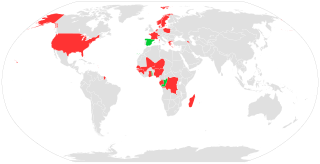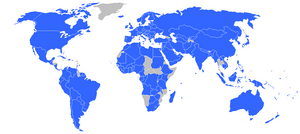The Franc Poincaré is a unit of account that was used in the international regulation of liability. It is defined as 65.5 milligrams of gold of millesimal fineness .900. Formerly it was identical to the French franc, although it has not been so since the 1920s.
The Montreal Convention is a multilateral treaty adopted by a diplomatic meeting of ICAO member states in 1999. It amended important provisions of the Warsaw Convention's regime concerning compensation for the victims of air disasters. The Convention attempts to re-establish uniformity and predictability of rules relating to the international carriage of passengers, baggage and cargo. Whilst maintaining the core provisions which have served the international air transport community for several decades, the treaty achieves modernization in a number of key areas. It protects passengers by introducing a two-tier liability system that eliminates the previous requirement of proving willful neglect by the air carrier to obtain more than US$75,000 in damages, which should eliminate or reduce protracted litigation.

Lost luggage is luggage conveyed by a public carrier such as an airline, seafaring cruise ship, shipping company, or railway which fails to arrive at the correct destination with the passenger. In the United States, an average of 1 in 150 people have their checked baggage misdirected or left behind each year.

UNIDROIT is an intergovernmental organization whose objective is to harmonize private international law across countries through uniform rules, international conventions, and the production of model laws, sets of principles, guides and guidelines. Established in 1926 as part of the League of Nations, it was reestablished in 1940 following the League's dissolution through a multilateral agreement, the UNIDROIT Statute. As of 2023 UNIDROIT has 65 member states.
In a contract of carriage, the consignee is the entity who is financially responsible for the receipt of a shipment. Generally, but not always, the consignee is the same as the receiver.
Aviation law is the branch of law that concerns flight, air travel, and associated legal and business concerns. Some of its area of concern overlaps that of admiralty law and, in many cases, aviation law is considered a matter of international law due to the nature of air travel. However, the business aspects of airlines and their regulation also fall under aviation law. In the international realm, the International Civil Aviation Organization (ICAO) provides general rules and mediates international concerns to an extent regarding aviation law. The ICAO is a specialized agency of the United Nations.

Bag tags, also known as baggage tags, baggage checks or luggage tickets, have traditionally been used by bus, train, and airline carriers to route checked luggage to its final destination. The passenger stub is typically handed to the passenger or attached to the ticket envelope:
- to aid the passenger in identifying their bag among similar bags at the destination baggage carousel;
- as proof—still requested at a few airports—that the passenger is not removing someone else's bag from the baggage reclaim hall; and
- as a means for the passenger and carrier to identify and trace a specific bag that has gone astray and was not delivered at the destination. The carriers' liability is restricted to published tariffs and international agreements.
Major Kenneth Macdonald Beaumont CBE DSO was a British lawyer, Air Service Corps officer, and figure skater. He made a major contribution to the development of international aviation law.
A contract of carriage is a contract between a carrier of cargo or passengers and the consignor, consignee or passenger. Contracts of carriage typically define the rights, duties and liabilities of parties to the contract, addressing topics such as acts of God and including clauses such as force majeure. Among common carriers, they are usually evidenced by standard terms and conditions printed on the reverse of a ticket or carriage document. Notification of a shipment’s arrival is usually sent to the "notify party", whose address appears on the shipping document. This party is usually either the buyer or the importer.
The Hague–Visby Rules is a set of international rules for the international carriage of goods by sea. They are a slightly updated version of the original Hague Rules which were drafted in Brussels in 1924.
The Hague Rules of 1924 is an international convention to impose minimum standards upon commercial carriers of goods by sea. Previously, only the common law provided protection to cargo-owners; but the Hague Rules should not be seen as a "consumers' charter" for shippers because the 1924 Convention actually favoured carriers and reduced their obligations to shippers.
The Hamburg Rules are a set of rules governing the international shipment of goods, resulting from the United Nations International Convention on the Carriage of Goods by Sea adopted in Hamburg on 31 March 1978. The convention was an attempt to form a uniform legal base for the transportation of goods on oceangoing ships. A driving force behind the convention was the attempt by developing countries' to provide all participants a fair and equal chance of succeeding. It came into force on 1 November 1992.
CIV or International Convention for the transportation of Passengers in rail transport refers to a set of uniform rules shared by European railway operators, to cover international journeys.

The "Rotterdam Rules" is a treaty proposing new international rules to revise the legal framework for maritime affreightment and carriage of goods by sea. The Rules primarily address the legal relationship between carriers and cargo-owners.
The Convention on Offences and Certain Other Acts Committed on Board Aircraft, commonly called the Tokyo Convention, is an international treaty concluded at Tokyo on 14 September 1963. It entered into force on 4 December 1969, and as of 2022 has been ratified by 187 parties.
The International Convention on Civil Liability for Oil Pollution Damage, 1969, renewed in 1992 and often referred to as the CLC Convention, is an international maritime treaty admistered by the International Maritime Organization that was adopted to ensure that adequate compensation would be available where oil pollution damage was caused by maritime casualties involving oil tankers.

Stephen Latchford was a United States diplomat, lawyer and one of America's earliest experts in aviation law. A federal government employee, Latchford started as a clerk working in the Panama Canal Zone. For the next forty years, he rose through the ranks of the U.S. Foreign Service to become one of its most senior members.
The Hague Protocol, officially the Protocol to Amend the Convention for the Unification of Certain Rules Relating to International Carriage by Air, is a treaty signed on September 28, 1955, in The Hague. It serves to amend the Warsaw Convention. While officially the Hague Protocol is intended to become a single entity with the Warsaw Convention, it has only been ratified by 137 of the original 152 parties to the Warsaw Convention. The binding version of the treaty is written in French, but certified versions also exist in English and Spanish. The official depository of the treaty is the Government of Poland.
The Athens Convention relating to the Carriage of Passengers and their Luggage by Sea (PAL) is an International Maritime Organization (IMO) legal Convention.





